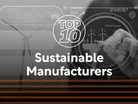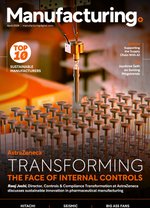Top 10: Sustainable Manufacturers

The manufacturing sector represents 54% of global energy usage and is responsible for 20% of global emissions. The Ellen MacArthur Foundation has reported that if the manufacturing industry adopted a circular economy, it could save up to US$630bn each year on raw materials across the EU alone. Across the world, consumers and stakeholders are taking note of sustainability initiatives taken by manufacturers.
These are our Top 10 food, textile, automobile and pharmaceutical manufacturers, who are working hard to ensure that sustainability is their strength, from factory floor to the consumers hands.
Launched in 2001, fashion designer Stella McCartney has been dedicated to being kinder to Mother Earth, animals and each other.
“We are one of the most harmful industries to the planet,” she says. “I hope that people will be responsible in our industry to make changes that go above and beyond a financial decision.”
From reducing water usage to using recycled manufacturing waste Stella McCartney is drawn to lowering the environmental impact of its fashion.
Revenue: £40m (US$50m)
Employees: 1,400
CEO: Amandine Ohayon
Founded: 2001
The way Dassault Systèmes sees it, the world needs manufacturers - and the French company is ready to unleash sustainable innovation to help the industry reduce its carbon footprint. The software company specialises in 3D design, simulation and product lifecycle management solutions.
“There is no contradiction between industrial excellence and sustainability,” says Guillaume Vendroux, Dassault Systèmes’ DELMIA CEO. “In fact, if this is achieved through lean processes it is the very path to sustainability. It is the robust, scientific way to achieve your goals.”
Revenue: €4.5bn (US$4.3bn)
Employees: 22,500
CEO: Bernard Charlès
Founded: 1981
8. Patagonia
85% of clothing ends up in landfill, or gets incinerated. In order to reduce the damage that fashion causes, Patagonia encourages customers to wear their clothing for longer and reduce overall consumption: buying less, repairing more and trading in.
Through its Worn Wear programme, Patagonia is also committed to using sustainable materials in its manufacturing, from organic cotton to repurposed fishing nets.
Patagonia also engages in due diligence activities to support fair labour and safe working conditions across its factories and farms.
Revenue: US$209m
Employees: 3,000
CEO: Ryan Gellert
Founded: 1973
7. Toyota
Toyota was formed in 1937 in Japan and through its dedication to quality and sustainability, the company has grown to become a leading automotive manufacturer.
This year, Toyota has increased its production in the US, as the company prepares to start production of all-electric SUVs in the country, with a US$1.3bn investment. Toyota’s regional strategy in the area is focused on several particular areas, such as reducing carbon emissions and recycling materials, protecting biodiversity and encouraging conservation through water stewardship.
Revenue: US$267bn
Employees: 370,000
CEO: Kōji Satō
Founded: 1937
6. Medtronic
Medical equipment manufacturer Medtronic aims to become carbon neutral across its operations by fiscal year 2030 and to reduce its carbon emissions to net zero in its supply chain and logistics, by fiscal year 2045.
To minimise waste and extend product life, Medtronic is constantly on the lookout for ways to optimise how products are designed, built, used, reused, recycled and disposed of. To lower energy consumption, Medtronic ensures that its manufacturing facility equipment runs smoothly. Energy efficient LED lights have been installed saving US$3m annually.
Revenue: US$31bn
Employees: 95,000
CEO: Geoffrey S. Martha
Founded: 1949
5. Philips
Philips is a healthcare technology company which aims to improve 2.5bn lives each year by 2030, by investing in people’s health and wellbeing. The company manufactures items such as medical imaging equipment, household appliances, lighting and telecommunications equipment. In its Eco Design process, Philips applies Life Cycle Analysis, which allows the company to examine the environmental impact of a product at each stage of its life – from raw material extraction through manufacturing, to distribution, use and maintenance, then finally, disposal or recycling.
Revenue: €17bn (US$18bn)
Employees: 74,451
CEO: Roy Jakobs
Founded: 1891
4. Siemens
Siemens works across industry, healthcare, infrastructure and transport. The company aims to deliver flexible and scalable digital manufacturing solutions. Now, its attention is on utilising environmentally friendly materials, as demanded by its customers and wider society. Additive Manufacturing is one such example where Siemens is making an impact in sustainable manufacturing, as this allows higher plant productivity and supply chain resiliency. As a result of implementing such processes, Siemens has seen 85% less energy consumption and 90% carbon footprint reduction.
Revenue: €86bn (US$93bn)
Employees: 320,000
CEO: Roland Busch
Founded: 1847
Automation machinery manufacturer Schneider Electric is on a mission to be the digital partner for sustainability and efficiency.
A new sustainability ranking by ABI Research has examined some of the largest industrial manufacturers. Schneider Electric was celebrated for its sustainability and energy management expertise across all of its offerings and targeting carbon neutrality within its own operations by 2025, in addition to 90% renewable energy use, 50% green material in its products and 80% of revenue tied to its Green Premium standard by 2025.
Revenue: €34bn (US$36bn)
Employees: 162,300
CEO: Peter Herweck
Founded: 1836
2. Tesla
Tesla CEO Elon Musk has a “Master Plan”, with which he aims to build a sustainable energy civilization - where the electric vehicle company will lead the world in an effort to eradicate fossil fuels and convert the world to survival on sustainable energy. Master Plan 3 includes adding renewable power to the existing grid and using high-temperature heat delivery and hydrogen for industrial applications. The world will be run on electric vehicles, including planes and boats. Tesla projects it will take US$10trn in investments to bring about this sustainable future powered by renewable energy.
But that civilization starts at home. Every Tesla Gigafactory is designed to be able to manufacture electric vehicles sustainably, with a firm limit on waste, water usage and energy consumption. For example, the Texas Gigafactory was designed with highly efficient, low emissivity windows which reduce building heating and cooling demand.
Revenue: US$81bn
Employees: 140,400
CEO: Elon Musk
Founded: 2003
1. Unilever
Unilever also aims to be a leader in the transition towards a global zero carbon economy. The company manufactures products across beauty, personal care, home care, nutrition and most importantly, ice cream (including Wall's, Ben & Jerry's and Magnum).
The ‘Unilever Sustainable Living Plan (USLP)’ outlines its targets to reduce greenhouse gas emissions, limit water use and enforce waste reduction across the world. The company has taken on board many lessons learned through the recent supply chain disruptions.
In Kenya, Rasoa Wafula, Unilever Supplier Program Diversity Lead, has encouraged Kenyan manufacturers to source locally.
“The impact of COVID-19 underscored the importance of localisation for long-term survival,” says Ms Nekesa. “Unilever, in collaboration with The Kenya Association of Manufacturers, has customised this programme not only to assist SMEs scale up locally but also regionally and internationally.”
Unilever seeks stronger visibility on the ground, giving stakeholders greater confidence that Unilever’s manufacturing processes are sustainable.
Revenue: US$63bn
Employees: 138,000
CEO: Hein Schumacher
Founded: 1929
******
Make sure you check out the latest edition of Manufacturing Digital and also sign up to our global conference series - Procurement & Supply Chain 2024 & Sustainability LIVE 2024
******
Manufacturing Digital is a BizClik brand.
- Reviewing Trump's First Term to Prepare for the SecondProduction & Operations
- Unilever Speaks on Failure of Global Plastics TreatySustainability & ESG
- Schneider Electric's Strategic Human-focused DigitalisationDigital Factory
- Schneider Electric: Forging a Path Forward on PlasticSustainability & ESG



